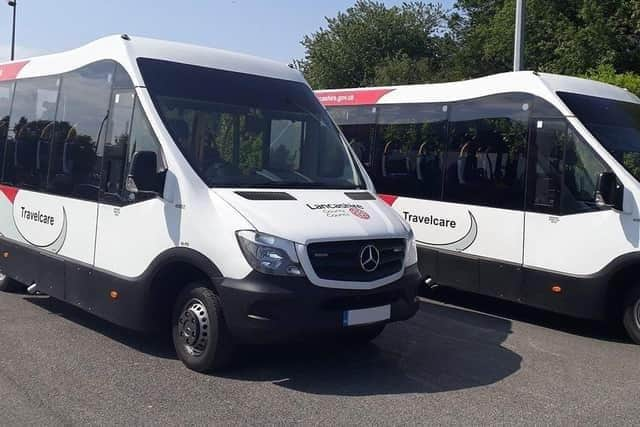Lancashire's £6m overspend on getting children with special needs to school blamed on increased demand and journey time limits
and live on Freeview channel 276
The forecast overspend has resulted from what the authority describes as “significant increases” in passenger numbers and the need to stick to statutory guidance which sets out the maximum journey times that youngsters should face each day - 45 minutes each way for primary school children and 75 minutes for those at secondary level.
The details were presented to a meeting of the authority’s scrutiny management committee last month, which heard that County Hall’s home-to-school transport budget was expected to be overshot by £6.4m during the 2023/24 financial year - mainly to meet SEND transport obligations.
Advertisement
Hide AdAdvertisement
Hide AdDeputy leader and cabinet member for resources Alan Vincent said growing demand was a national issue and that Lancashire had already implemented all of the recommendations of a recent County Councils’ Network (CCN) report about how to “mitigate” such overspends.


The meeting heard that a working group of officers and councillors was currently considering what else could be done to reduce the cost pressure for the authority.
Several committee members commented on the lengthy distances travelled by some SEND pupils - including one who was being taken from South Ribble to their nearest recommended school in Kirkby Lonsdale.
County Cllr Scott Cunliffe said if the predicted overspend was going to be repeated year after year, there must come a point where that money is best spent reviewing the “geographical layout” of SEND schools and bringing them “closer to communities”.
Advertisement
Hide AdAdvertisement
Hide AdCounty Cllr Vincent agreed that the location of schools was “a major part of the issue”. While he noted that demand in different areas was always fluctuating - and so difficult to predict - he said the aim was “to get as many SEND places in the right [parts of] Lancashire so that we don't have to take kids way too far [from home, because] it costs us a fortune to do that".
To that end, he appealed to any mainstream schools who had not already done so to register their interest in having a SEND unit attached to them, as part of a rolling programme of such developments that the county council is carrying out.
“It’s the best way of doing it, rather than building special schools,” County Cllr Vincent explained. “Building additional facilities within existing schools is better for children, in our view, and is also better for us financially.”
The statutory guidance on journey times is considered “a general rule”, meaning that the limits - which including walking times to pick-up points - can be exceeded where it is deemed reasonable to do so.
Advertisement
Hide AdAdvertisement
Hide AdThe CCN report called for a home-to-school transport policy that was “fit to address 21st-century challenges” by being “financially, educationally and ecologically sustainable for government and for families”.
Its recommendations included the introduction of means testing, so that families of SEND children whose household income exceeds a certain level would be expected to make a financial contribution to their travel costs.
The report also stated that use of taxis, as opposed to minibuses, should be “a last resort” and that transport should usually be provided only to and from central pick-up and drop-off points - not to the child’s own doorstep.
The CCN called for clear guidance to ensure SEND tribunal rulings on the school placements allocated to pupils “cannot be made without full consideration of the relative transport costs” or that it is made clear such rulings “do not supersede the local [authority] decision on the nearest suitable school for the purposes of transport”.